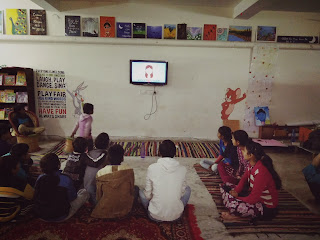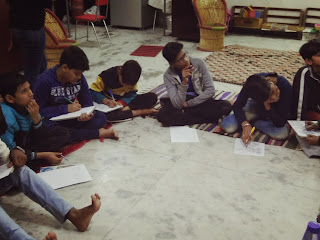“There is lot of
pressure as to take care of things at home due to not so good financial
situation, I feel responsible and want to support my parents. Because of this, I
refrain from spending money and many a times I sit alone thinking about it”,
says a 15 year old participant on asking about the distress situation.
“Sometimes I am scolded
for no good reason in front of many people, or when I am forced to study or
when I have fight with a friend, I cry and hide myself from other people. I don’t
know whom to talk to!” shares another participant.
Adolescence is a
strange phase of life where though the adolescents are expected to behave and
act maturely because they are growing up however when they try to do so or take
decisions for themselves they are constantly reminded of the fact that they are
not old enough! So it’s more like a see-saw resulting in confusion and chaos
leaving them more puzzled. And such situations can affect their mental health
in many ways. So in order to understand the need for conversations around “Mental
health” we conducted a workshop with the adolescents from ‘My Perch’ on the
same.
The workshop began with
a fun energizer “Boom shake- boom shake” which I recently learned and enjoyed being
part of, so the fun smoothly translated here as well! This was followed by
screening of short video on “Mental health”. The participants were divided into
two groups to do mind mapping around ‘Mental Health’ and “Accha Lagna”
I was sitting with the
group of the participants which was invited to share the words, feelings and
thoughts that come to their minds when they hear the word “Mental Health”-
Initially I could feel the hesitance towards sharing around the word, 3 of them
straight off declared that they haven’t heard the word, which obviously to a
point was understood- however as one of the girl initiated and then slowly the
word was dissected and converted to relatable feelings, the wall of silence was
hit hard. So according to the 1st group- Mental health could be
positive or negative, including positive feelings and thoughts, excitement,
laughing, feeling relaxed, being with oneself,
don't feel good when people gossip about others, feeling embarrassed, stress to
dress well, hesitation in talking, stress to make friends,
stress to share about oneself to others, stress of saying lies after committing
a mistake, Irritation, depression, insult, studies problem,
something to do with mind, stress about health, headache, stress
of being scolded, doing homework, getting good marks.
While the
other group talked in details about the things that made them happy or what
they like doing to make them happy which included- reading Hindi book, when my
friends ask me to solve Mathematics question and I'm able to solve it, getting
good marks at school, being able to answer question asked by teacher,
acting, cheating and not getting caught, singing, working on computers, making
new friends etc.
After the detailed mind
mapping, what does well-being, mental health and mental illness actually means
through the examples were explained. In the next activity, the participants
were invited to write down all the situations that are stressful to them, then
rate them according to the distress meter and also list as to how do they deal
with these situations individually.
It was an interesting
activity because it was probably for first time they would be writing their
fears on a paper in a way facing it, unloading it from their heart without the
feeling of being judged because this won’t be shared in the large circle and
everyone is gonna do it! Few of the situations included- being scolded in front
of people, getting beaten, getting low marks, being abused, getting punished
for no reason, anxiety of not completing work on time, exam stress, forced to
study, fighting, friends not talking , low marks in examination, anxiety of
finances at home, being forced to do something they don’t want to do.
Their most possible
reactions or handling the situation involve crying, getting angry, not eating
food, confusion; hide themselves behind books and in music. Also in very few
situations they have conversations to like really share and solve the problem
in front of them.
It’s also crucial that
when an adolescent is in distress situation, they need to have someone to talk
to instead of keeping things to their heart and let it affect their mental
health. So our next activity involved in searching for the ideal characteristics
of the ‘support’ they seek.
“Someone
who could understand me. I generally come to the library after school and share
anything that I want to with Kamya didi. She listens and understands me. From
my face she gets to know that I'm upset and I trust her”
“Someone
who is strong, with whom I can share my problems, someone who doesn't make fun
of my problems, someone who considers my problems his own to help me, That
someone should be a girl, she should speak to me with a smile, shouldn't scold
me, she can be like a real sister to me, stay with me whenever I need her and
listen me well”
“Someone
who knows me well, someone who knows when I get angry, happy and listen to me
well and whenever I'm troubled that person can help. For me this person is my
mother as she knows me really well and she checks on me when I'm in trouble and
helps me resolve problems. I'm also very open to my mother and can share
everything with her.”
“Someone
who listens to me, understands and give me solutions. Can be either boy or
girl, shouldn't judge me based on my sharing.”
“Someone
with whom I can share my worries and can trust.”
From this simple
yet very essential activity, we could understand that basic quality was trust
and not being judgmental and how these basic qualities are absent in the people
around them and at the same time emphasizing the need for existence of strong
support system for better mental well-being of the adolescents!
The last
part of the workshop was the “Laughter therapy” where through various small
steps we all laughed away our worries with a promise of beginning a laughter
club in “My Perch”

















No comments:
Post a Comment